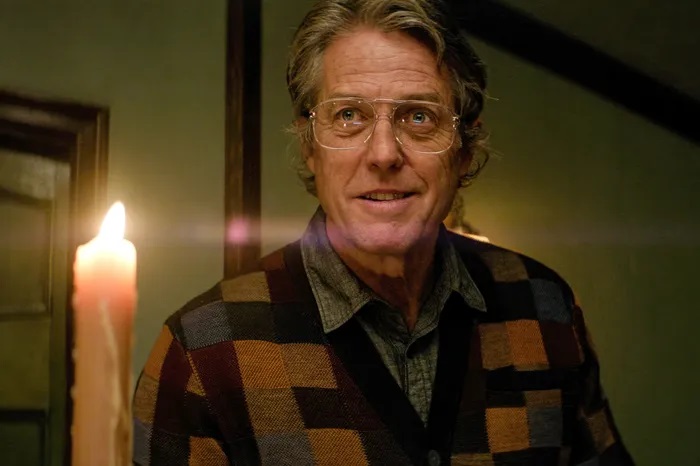In Heretic, directors Scott Beck and Bryan Woods turn the horror genre on its head, using conversation instead of suspenseful silence to tell a chilling story. The film takes the premise of a theological debate between a pair of innocent Mormon missionaries and an unsettling host. It stretches it to its limits, pushing the audience to question belief, fanaticism, and human manipulation. Yet, while the philosophical dialogue invites viewers in, the film’s intensity gradually dilutes, leaving a thought-provoking impression but not entirely satisfying.
The story opens with Mormon missionaries Sister Barnes (Sophie Thatcher) and Sister Paxton (Chloe East) knocking on the door of Mr. Reed (Hugh Grant) in a rainstorm. He’s a seemingly well-spoken intellectual who invites them in, offering blueberry pie and promises of polite conversation. At first, the discussion is civil, with the girls reciting familiar beliefs while Reed listens. Yet, as the conversation unfolds, it becomes clear Reed’s intentions are far from innocent. Grant’s Mr. Reed is the film’s most potent force; he combines a chilling intellect with a disturbing charm, dismantling religious ideology while hiding his dangerous agenda.
Hugh Grant shines in the role, balancing wit, condescension, and a peculiar allure in his portrayal of Reed. He masterfully switches between philosophical musings and darker, biting questions that shift the conversation from theology to unsettling realms. The movie’s strongest feature is Grant’s ability to oscillate between intellectual critique and unhinged menace. Even when quoting scriptures or arguing against religious doctrines, he manages to convey a character who is both dangerously manipulative and, at times, almost pitiable in his self-destructive zeal.
Sophie Thatcher and Chloe East deliver compelling performances as naive missionaries who are quickly over their heads. Thatcher’s Barnes is more grounded and alert, sensing Reed’s intentions before her partner does, while East’s Paxton, the quieter of the two, takes Reed’s prodding to heart in ways that test her resilience. Together, they strike a believable dynamic, reacting to Reed’s barbs with a mix of innocence and survival instinct that underscores their characters’ faith and fear. They prove to be engaging foils to Grant’s Reed, though the relentless dialogue sometimes limits the evolution of their characters beyond being a sounding board for Reed’s philosophical games.
The Heretic shines brightest in its first half when Beck and Woods introduce complex themes, like Reed’s comparison of religious stories to versions of Monopoly—a modern take on humanity’s repetitive cycles of faith and power. Reed’s manipulation grows as he questions the very foundations of religious belief, pushing the missionaries into darker reflections. His relentless questioning explores provocative themes but teeters into redundancy, circling back to the same questions without offering much new insight. Instead of evolving into something more sinister, the film doubles down on dialogue, forgoing tension for intellectual sparring that starts to feel hollow.
In the film’s third act, Beck and Woods gesture toward horror with scenes set in Reed’s claustrophobic basement, but these moments lack the bite needed for a gripping finale. The chilling, cerebral nature of the first half fizzles as Reed’s constant questioning becomes repetitive and wears thin without adding real menace. Instead, what might have been a climactic descent into terror feels like a monologue-heavy finale that misses its own suspenseful potential.
Watching with my 13-year-old companion, I admired the cast and philosophical undertones but shared a sense of dissatisfaction with the film’s trajectory and anticlimactic ending. Compared to a more balanced thriller like The Black Phone, which integrates its scares more fluidly, Heretic feels stuck in its head, speaking in circles when it could heighten its dread.
For all its risks, Heretic succeeds as an experiment in dialogue-driven horror but fails as a full-fledged thriller. The film’s best moments are found in Grant’s chilling portrayal of Reed, who plays mind games with fierce intelligence and unsettling charm. While Heretic is undoubtedly unique, it may leave viewers longing to escape its relentless loop of theological rhetoric, like its protagonists.
